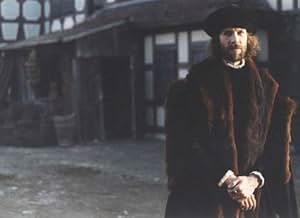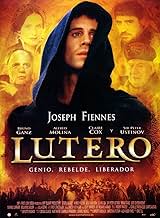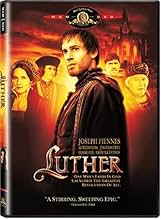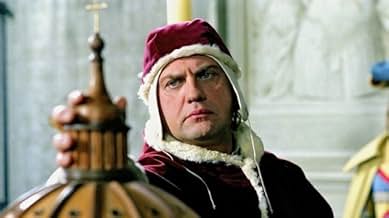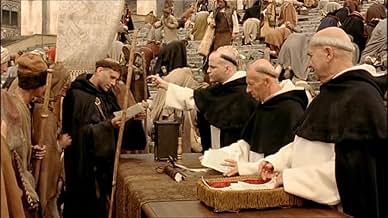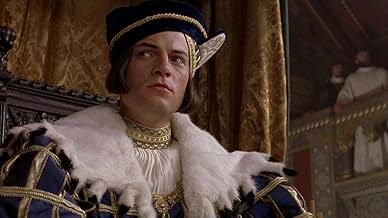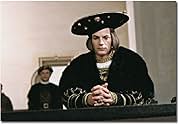Während des frühen 16. Jahrhunderts beginnt der idealistische deutsche Mönch Martin Luther, angewidert vom Materialismus der Kirche, seinen Disput, der schließlich zur Reformation führen wir... Alles lesenWährend des frühen 16. Jahrhunderts beginnt der idealistische deutsche Mönch Martin Luther, angewidert vom Materialismus der Kirche, seinen Disput, der schließlich zur Reformation führen wird.Während des frühen 16. Jahrhunderts beginnt der idealistische deutsche Mönch Martin Luther, angewidert vom Materialismus der Kirche, seinen Disput, der schließlich zur Reformation führen wird.
- Regie
- Drehbuch
- Hauptbesetzung
- Auszeichnungen
- 4 Gewinne & 1 Nominierung insgesamt
- Frederick the Wise
- (as Sir Peter Ustinov)
Empfohlene Bewertungen
Director Eric Till presents Rome as a shattered city where depravity was everywhere This infuriated Luther who could not believe that Rome is a circus describing it as 'a running sewer, where you can bye anything, sex, and salvation, and where they also have brothels for clerics.'
He also witnesses the church collecting coins from the people supposedly to free their sins to build Saint Peter's Church and would be therefore released from Purgatory and enter the Heaven
Luther was eventually branded a heretic, his books examined and burned, and anyone who presumes to infringe Pope Leo's excommunication will stand under the wrath of Almighty God and the Apostles Peter and Paul
The reaction of the peasants in Germany was against the reaction of the Inquisition who was burning his writings For the German people "you can't burn his ideas." For the Church, his works shall be erased from the memory of man!
Luther's criticism was not against his Holiness, Pope Leo X, but of those rogues who claim to represent him His goal was not to quarrel with the Pope or the Church but to defend them than mere opinion! The Gospel, as he affirmed, cannot be denied for the word of man!
As a loyal son of the Church, Luther finds sanctuary with Prince Frederick, who finds him too daring for him but decides not to surrender him to Rome Luther goes on to produce his first translation of the New Testament Bible into German language He marries the ex-nun, Katerina Von Borg, becomes a hero to the people and in spite of his outlaw status with the Church authorities, his followers ultimately break with Rome
Joseph Fiennes played intensely the intriguing story of a brilliant Augustinian monk with an independent mind who is not interested in comfort but in the truth!
Sir Peter Ustinovin his final rolerealizes the danger Luther poses to the Catholic Church
Alfred Molina as Brother John Tetzel, is the showman terrorizing the good people of Jüterbog into purchasing special indulgences letting everyone know the fires of hell awaiting those who did not contribute
Johann Von Staupitz is the spiritual counselor who knows that Martin has aptitude for law, and could be send to Rome for a legal brief
Claire Cox is Luther's beautiful wife who stood behind her young 16th century monk driven by courage and outrage against a powerful Medieval Church
What's troubling, then, about Luther is that the movie just isn't long enough to portray the story accurately, and therefore it feels not only unfinished but full of gaps. Things happen one against another, people come and go with little explanation, and yet the story marches on. Luther's mission is clear, but his purposes are so boiled down that only a few of his famous Theses are actually voiced in the movie. Shortening the story was obviously necessary for a movie, but in all, I think it acts against the dramatic effect of the film as a whole because things end up with a certain disjointed feel.
Still, the cinematography is brilliant and the acting nearly perfect. The film is worth seeing for its visual splendor (in both performance and sets) alone, and certainly as an introduction to a complex historical topic.
The performances of Fiennes, and Ustinov were particularly strong, but I think viewers will fall in love with Ustinov's portrayal of Prince Friedrich, the Wise. He's like the cuddly grandpa you always wished you had (or maybe you did have) who didn't care what people thought of them, said and did what they pleased, and no one gave them any crap for it. I truly think it is Oscar calibre work. I think you will too.
Firth as Aleandro was convincing as the Roman Bureaucrat determined to get ahead by keeping the peace between Leo and Charles. Ganz plays a great pastor to Luther - throughout his life - one that we should all be so lucky to have looking after our spiritual well being.
Hofschneider, as the eager to learn and willing to "suffer all for the Gospel" assistant (Ulrick) to Luther made it very easy for the viewer to feel a connection to him. His loyalty was genuine, and not self serving. A true man of the cloth.
Although not on screen long, Clair Cox does a nice job showing just how strong a woman Katie was. Is it any wonder that she went on to run a rather successful business apart from Martin's influence?
For sure this is a courageous movie about a stalwart leader of Church, state, and society to whom western civilization owes a great debt. While the 1950's version of Luther may be more complete in some respects, it is not nearly as accesable to today's viewers who are used to big budget, visually stimulating, and fast paced movies
Knowing the film world, I doubt this film was made to glorify God. It probably was made more to make the Roman Catholic church look bad, or to glorify a rebel and a man of the people: "the peoples' liberation" as the back cover of the DVD states.
Whatever the motive, it stays true to history and it's nice to see that for a change. To those unfamiliar with Luther, he was the founder of the Protestant denomination. Luther was monk who saw and heard things he thought were unscriptural and broke off from the Catholic Church in "protest." Hence, the "Protestant" church was formed.
Anyway, not only was the story done well, so was the cinematography. This is one gorgeous movie to ogle, well-filmed with high production values. The scenery, sets and costumes are all first-rate.
Joseph Fiennes (Luther) is a bit wimpy-looking but his character certainly isn't. As the subject of indulgences and other practices begin to transform Luther's ideas of what Jesus' church should be, the story grows in intensity as Luther gets pressured by the Catholic hierarchy as his protest issues become public.
What happens to him and to the masses because of his actions are revealed in pretty dramatic form. Obviously the story is far more complex than two hours can give it but the filmmakers did a pretty good job condensing it to make the time constriction.
Notes: This was Peter Ustinov's last movie. On the DVD, being that is was a fairly expensive one, I am surprised there were no "extras." In all, however, a solid film but it will definitely offend Roman Catholics.
Wusstest du schon
- WissenswertesThis was Peter Ustinov's final theatrical film before his death on March 28, 2004 at the age of 82.
- PatzerIn the movie Luther quotes the Bible by chapter, and verse. Versification of the Scriptures was not added until five years after Luther's death in 1546. The French scholar-printer Estienne introduced verse numbering and divisions in his Greek-Latin New Testament in 1551. In 1552 he printed a French-Latin New Testament, also with the verse divisions. And in 1553 he printed a French translation of the Bible with verse divisions throughout. Within the same decade the system of verse divisions spread widely, influenced by the adoption of this system in the Geneva Bibles.
- Zitate
Martin Luther: Unless I am convinced by Scripture and by plain reason and not by Popes and councils who have so often contradicted themselves, my conscience is captive to the word of God. To go against conscience is neither right nor safe. I cannot and I will not recant. Here I stand. I can do no other. God help me.
- VerbindungenVersion of Martin Luther (1953)
Top-Auswahl
- How long is Luther?Powered by Alexa
Details
- Erscheinungsdatum
- Herkunftsländer
- Sprachen
- Auch bekannt als
- Lutero
- Drehorte
- Coburg, Bavaria, Deutschland(Veste Coburg, castle)
- Produktionsfirmen
- Weitere beteiligte Unternehmen bei IMDbPro anzeigen
Box Office
- Budget
- 30.000.000 $ (geschätzt)
- Bruttoertrag in den USA und Kanada
- 5.791.328 $
- Eröffnungswochenende in den USA und in Kanada
- 908.446 $
- 28. Sept. 2003
- Weltweiter Bruttoertrag
- 29.632.684 $
- Laufzeit2 Stunden 3 Minuten
- Farbe
- Sound-Mix
- Seitenverhältnis
- 1.85 : 1
Zu dieser Seite beitragen



